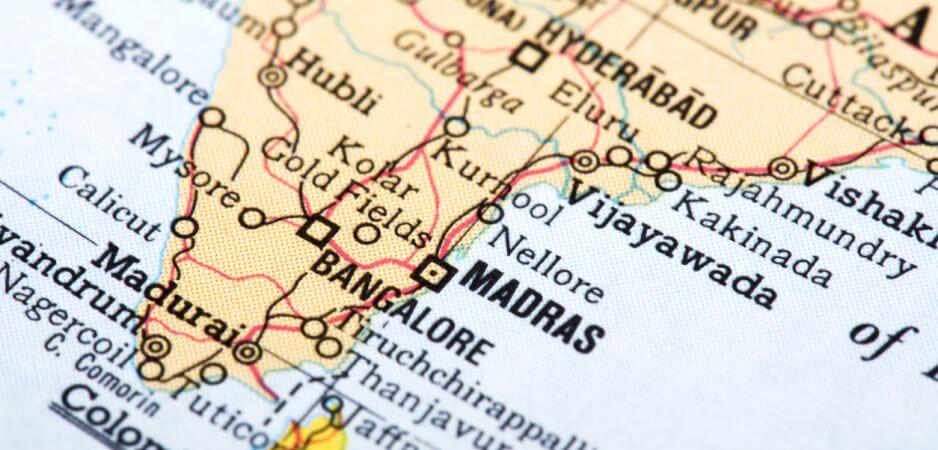After the death of one of India’s most iconic female politicians, Tamil Nadu has been hit with crisis after crisis.
Every week, a nail-biting story arises in Tamil Nadu, a state in southern India known for its cultural richness dating back some 1.5 million years. Over three months since the death of one of India’s most powerful politicians, former Chief Minister J. Jayalalithaa, Tamil Nadu is in turmoil.
Fondly referred to as Puratchi Thalaivi (revolutionary leader) and Amma (mother), Jayalalithaa ruled the male-dominated political system in Tamil Nadu with an iron fist as the leader of AIADMK, one of two leading Dravidian parties in the state. She died on December 5, 2016, after a prolonged illness that forced her to be hospitalized for over two months.
Her confidant and second in command, O. Panneerselvam, took over as chief minister, stepping into the role he had twice previously held when Jayalalithaa had to step down over corruption charges—most recently in 2014, when she was sentenced to four years imprisonment by the Special Court in Bangalore. After a 27-day jail term and acquittal by the Karnataka Court, she returned to power in May 2015.
In February 2017, Panneerselvam resigned paving the way for Sasikala Natarajan, a close aide of Jayalalithaa, to become the next chief minister of Tamil Nadu. In late December, Sasikala was elected the general secretary of AIADMK. She had never contested an election in her life and was poised to become the new chief minister.
Power Vacuum
Tamil Nadu has faced a number of leadership crises in the past. The public have become disillusioned with politicians over a failure to stand up for the people, their aspirations and the Tamil identity.
It all started with a stand-off between Tamil Nadu and the neighboring state of Karnataka over the Kaveri River water treaty. The Karnataka government disobeyed a Supreme Court order to release 6,000 cusecs of water for agricultural purposes in September 2016. Things turned ugly when outrage spread and physical altercations arose between people of both states.
With Jayalalithaa in hospital, there was no strong thought process and authority shown by the Tamil Nadu government to condemn the Karnataka government. It is worthy to note that Jayalalithaa’s reputation was built on her decisive power she exercised during the water dispute with Karnataka, culminating in the famous walkout she staged during the talks of 2002. Last year, she was sorely missed and her letters couldn’t make up for her absence.
Immediately after the death of Jayalalithaa, Chennai was hit by Cyclone Vardha, one of the worst storms over the last two decades. The cyclone caused damage of $1 billion to industries in the city. Again, a lot of questions were raised over the government’s role in leading the relief work, which was mainly propelled by volunteers and students mobilized through social media.
Student Uprising
In January, Tamil Nadu saw a mass student uprising against the ban of Jallikattu, a traditional 2,500-year-old bull embracing sport. What started as a social media buzz quickly gathered steam as students took to the streets and the iconic Marina Beach to protest against what they perceived as a threat to Tamil identity. The ban led to an uproar in Tamil Nadu, where thousands of demonstrators gathered to protest peacefully against the Supreme Court ban.
Led by students and IT professionals, this was an apolitical movement that was compared to the Arab Uprisings of 2011. Schools and colleges were shut for a week, with the whole of Tamil Nadu coming to a standstill. To appease protesters, the state government announced an ordinance to allow Jallikattu to be conducted, thus circumventing the court verdict.
The protests also gave rise to other resolutions against foreign brand encroachment of the consumer market. Recently, the Tamil Nadu Traders Association passed a resolution to stop the sale of aerated drinks produced by multinational brands like Pepsi and Coca Cola across the state, citing the negative impact on health and the exploitation of water resources by these firms in setting up factories in Tamil Nadu. The Madurai High Court granted an injunction to stop these companies extracting water from the Thamirabarani River for production purposes.
The estimated loss of Rs1,400 crore ($210 million) is expected to hit companies like Pepsi and Coca Cola due to the ban by the traders association, which has over 15 lakh (1.5 million) members across 6,000 other organizations joining the cause. Already, top restaurants and cinemas in various parts of Tamil Nadu have stopped the sale of these products.
In the last few days of the protest, things turned ugly with violence allegedly perpetrated by the police following government orders to evict demonstrators. The internet is flooded with footage of police officers setting vehicles on fire and damaging both public and private property.
At the time, there was a general feeling that Tamil Nadu was missing a charismatic leader at the helm after the demise of Jayalalithaa.
Power Play in Tamil Nadu
These feelings were heightened by the selection of Sasikala as the next chief minister. Along with 12 other associates of the AIADMK party, Sasikala was once expelled by Jayalalithaa over alleged nepotism and a conflict of interests that involved favoring her relatives. She was accepted back into the party after she promised to sever ties with her family members.
With the imminent swearing in of Sasikala, things started going downhill. The state of Tamil Nadu has a documented electoral system and constitution dating back some 1,100 years in the village of Uttaramerur. So, it is ironic that such a state had allowed a person who had never faced an election in her life to become chief minister through loop holes in the system.
 In the final set of twists and turns, Sasikala, who was co-accused in the disproportionate assets case with Jayalalithaa, was convicted by the Supreme Court on February 14. Barred from contesting elections for the next 10 years, Sasikala handpicked Edappadi K. Palaniswami, to be her replacement.
In the final set of twists and turns, Sasikala, who was co-accused in the disproportionate assets case with Jayalalithaa, was convicted by the Supreme Court on February 14. Barred from contesting elections for the next 10 years, Sasikala handpicked Edappadi K. Palaniswami, to be her replacement.
With the main opposition party, the DMK, already tainted by scandals like the 2g spectrum scam, the public have started looking for alternative parties that would listen to the people and solve their problems. And with the new chief minister winning a troubled floor test amid scenes of violence in the legislative assembly, the political temperature is soaring. The public have lost faith in a political set up that has gone deaf to the voices of the people.
There have been rumors that leaders of the Jallikattu protest movement are coming together to form a political party and contest elections. But many are skeptical, with doubts over the experience of student and celebrity leaders who orchestrated the successful non-violent protests. With emotions soaring, there is a sense of an impending tussle for power in a state that just last year gave the ruling party a clear mandate to govern until 2021.
Tamil Nadu is on the verge of a revolution. People are furious like never before with both parties. The Dravidian ideology has changed and it is at a tipping point.
The views expressed in this article are the author’s own and do not necessarily reflect Fair Observer’s editorial policy.
Photo Credit: Omersukrugoksu
Support Fair Observer
We rely on your support for our independence, diversity and quality.
For more than 10 years, Fair Observer has been free, fair and independent. No billionaire owns us, no advertisers control us. We are a reader-supported nonprofit. Unlike many other publications, we keep our content free for readers regardless of where they live or whether they can afford to pay. We have no paywalls and no ads.
In the post-truth era of fake news, echo chambers and filter bubbles, we publish a plurality of perspectives from around the world. Anyone can publish with us, but everyone goes through a rigorous editorial process. So, you get fact-checked, well-reasoned content instead of noise.
We publish 2,500+ voices from 90+ countries. We also conduct education and training programs
on subjects ranging from digital media and journalism to writing and critical thinking. This
doesn’t come cheap. Servers, editors, trainers and web developers cost
money.
Please consider supporting us on a regular basis as a recurring donor or a
sustaining member.
Will you support FO’s journalism?
We rely on your support for our independence, diversity and quality.






